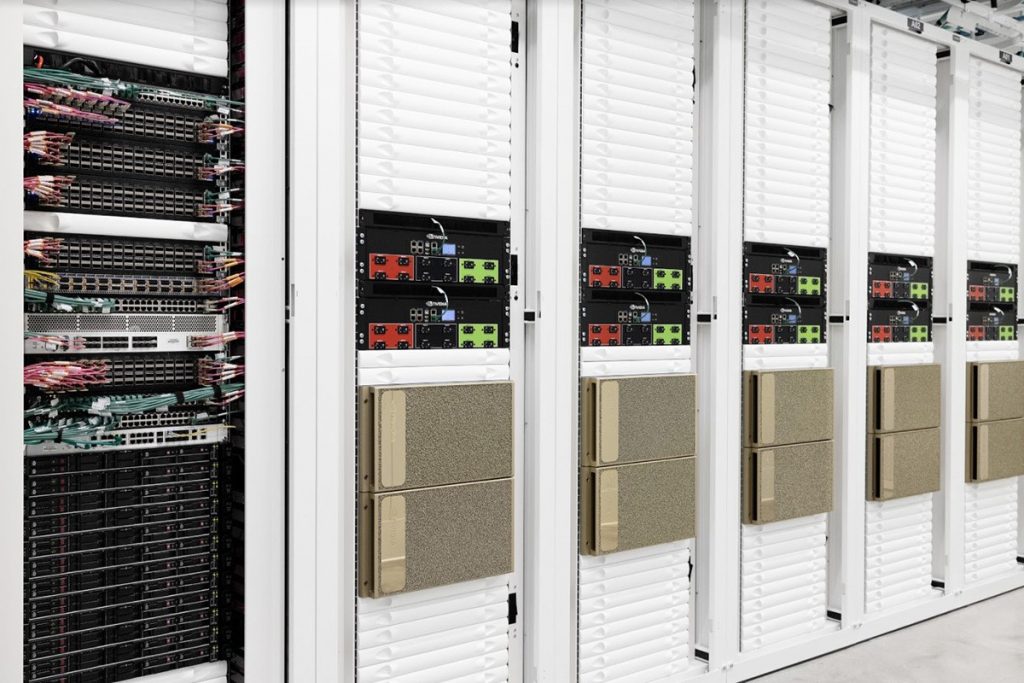
Nvidia and five healthcare organisations have launched what they claim is the UK’s fastest supercomputer. It will enable scientists and healthcare experts to use the powerful combination of AI and simulation to bolster the UK’s world-leading life sciences industry.
Dedicated to advancing healthcare, Cambridge-1 is a $100m (£74m) investment by Nvidia. Its first projects with AstraZeneca, GSK, Guy’s and St Thomas’ NHS Foundation Trust, King’s College London, and Oxford Nanopore include developing a deeper understanding of brain diseases like dementia, using AI to design new drugs, and improving the accuracy of finding disease-causing variations in human genomes.
“Cambridge-1 will empower world-leading researchers in business and academia with the ability to perform their life’s work on the UK’s most powerful supercomputer, unlocking clues to disease and treatments at a scale and speed previously impossible in the UK,” said Jensen Huang, founder, and CEO of Nvidia. “The discoveries developed on Cambridge-1 will take shape in the UK, but the impact will be global, driving groundbreaking research that has the potential to benefit millions around the world.”
David Hogan, vice president enterprise EMEA at Nvidia, added: “The Cambridge-1 project focuses on transforming healthcare, and bringing the new transformative technology of AI to healthcare and the healthcare ecosystem, to enhance medical breakthroughs and to do things are just not possible on traditional platforms.”
Cambridge-1 builds on the UK’s status as a global leader in life sciences, technology and AI by providing an advanced infrastructure for current and future generations to carry out groundbreaking research within the country. Computing experts have also ranked it 42 in the top 500 fastest supercomputers in the world.
Featuring 80 DGX A100 systems integrating Nvidia A100 GPUs, BlueField-2 DPUs, and NVIDIA HDR InfiniBand networking, Cambridge-1 is an Nvidia DGX SuperPOD that delivers over 400 petaflops of AI performance and 8 petaflops of Linpack performance. The system is at a facility operated by Nvidia partner Kao Data.

For a few years, the company has been working closely with partners – world-leading organisations and individuals – to develop mechanisms to bring AI to the point of care, and ultimately transform the lives of people throughout the world, according to Hogan.
Nvidia is collaborating with AstraZeneca to fuel faster drug discoveries creating a transformer-based generative AI model for chemical structures. Transformer-based neural network architectures, which have become available only in the last several years, allow researchers to leverage massive datasets using self-supervised training methods, avoiding the need for manually labelled examples during pre-training.
“Training AI algorithms on whole slide images is challenging in part because of the size of the images,” said Lindsay Edwards, vice president of Data Science and AI, Respiratory and Immunology, BioPharmaceuticals R&D at AstraZeneca. “Working with Nvidia on Cambridge-1 enables us to scale our current work and develop new methodologies advancing the use of AI in digital pathology.”
GSK’s research and development approach include a focus on genetically validated targets, which are twice as likely to become medicines and now make up over 70 per cent of its research pipeline. To maximise the potential of these insights, GSK has built capabilities at the intersection of human genetics, functional genomics and artificial intelligence, and machine learning.
“Advanced technologies are core to GSK’s R&D approach and help to unlock the potential of large, complex data through predictive modelling at new levels of speed, precision, and scale,” said Dr Kim Branson, senior vice president and global head of AI-ML at GSK. “We are pleased to partner with Nvidia to deliver on GSK’s drug discovery ambition and contribute to the UK’s rich life sciences ecosystem – both aims that have patient benefit at the centre.”
Working with partners at the cutting edge of genetics, genomics and AI/ML can ultimately help GSK predict more about human health, and develop better medicines that are twice as likely to succeed in the clinic and become approved therapies that benefit patients. Access to Cambridge-1 will also contribute additional computational power and state-of-the-art AI technology to GSK’s drug discovery process, according to Nvidia.
Meanwhile, King’s College London and Guy’s and St Thomas’ NHS Foundation Trust are using Cambridge-1 to teach AI models to generate synthetic brain images by learning from tens of thousands of MRI brain scans, from various ages and diseases. The goal is to use this synthetic data model to gain a better understanding of diseases like dementia, stroke, brain cancer, and multiple sclerosis and enable earlier diagnosis and treatment.
As this AI synthetic brain model can generate an infinite amount of never-seen brain images with chosen characteristics (age, disease, etc.), it will allow a better and more nuanced understanding of what diseases look like, possibly enabling an earlier and more accurate diagnosis, Nvidia said.
“Through this partnership, we will use a scale of computational power that is unprecedented in healthcare research,” said Professor Sebastien Ourselin, head of the School of Biomedical Engineering & Imaging Sciences at King’s College London. “It will be truly transformational for the health and treatment of patients.”
Another one of Nvidia’s partners, Oxford Nanopore Technologies, uses long-read sequencing technology in over 100 countries to gain genomic insights across a breadth of research areas – from human and plant health to environmental monitoring and antimicrobial resistance.
Oxford Nanopore deploys Nvidia technology in a variety of genomic sequencing platforms to develop AI tools that improve the speed and accuracy of genomic analysis. With access to Cambridge-1, Oxford Nanopore will carry out tasks relating to algorithm improvement in hours rather than days. These improved algorithms will ensure improved genomic accuracy for greater insights and quicker turnaround times in scientists’ hands, Nvidia has said.
“Harnessing the power of Cambridge-1 will help us further speed up our algorithm development to support powerful, accurate genomic analysis,” said Rosemary Sinclair Dokos, vice president of product and programme management at Oxford Nanopore. “This will enable the scientists using our technology on the ground to gain more insights than ever before, across a breadth of research areas.”

